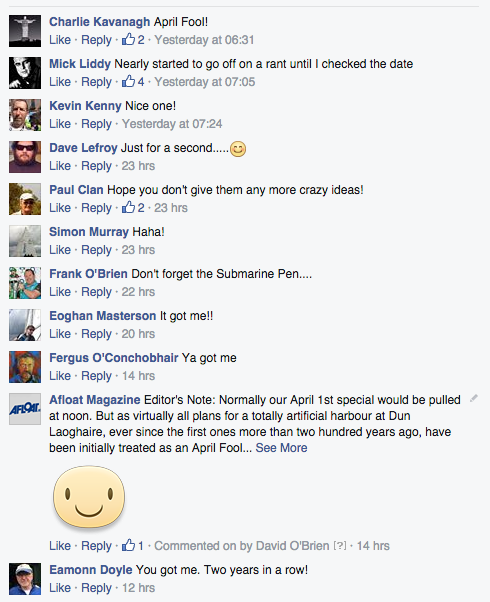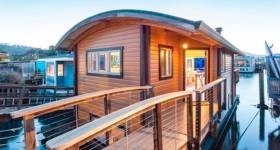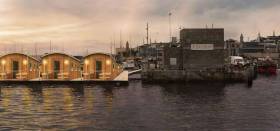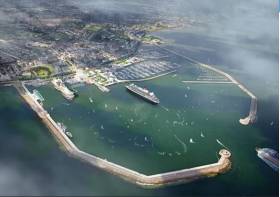Displaying items by tag: DLHC
‘Floating Homes’ Plan For Dun Laoghaire Harbour Moves Forward
#Property - Plans to develop “floating homes” in Dun Laoghaire Harbour — and refocus the area on accommodation as well as leisure — have moved a step forward as a formal procurement process is set to begin.
Last September, the Dun Laoghaire Harbour Company sought expressions of interest for plans comprising “a cluster of floating affordable homes” moored in the harbour.
“About two years ago we looked at the notion of a floating hotel,” Dun Laoghaire Harbour Company chief Gerry Dunne told the Sunday Independent. “This concept is the same — to utilise the water space for residential purposes, rather than just leaving it for leisure pursuits.”
The precise specification of the final homes has get to be determined, though a retail price of up to €350,000 is to be expected.
Dunne also expects that if the procurement process is completed in the first quarter of this year, “we could have the floating homes project up and running in 2019.”
The Sunday Independent has more on the story HERE.
Dun Laoghaire Seeks Interest For ‘Floating Homes’ Proposal
#Property - Plans for “a cluster of floating affordable homes” in Dun Laoghaire could soon transform the look of the South Dublin port’s waterfront.
The Dun Laoghaire Harbour Company is seeking expressions of interest via the State’s eTenders website for the development of as many as 50 single-storey homes, which would float on a pontoon on the western side of the Coal Harbour Dock.
According to The Irish Times, harbour company CEO Gerry Dunne says the floating homes — around the size of the average two-bed apartment — would have a capital cost of between €250,000 and €300,000 and would be geared towards those looking for a “starter or retirement” home.
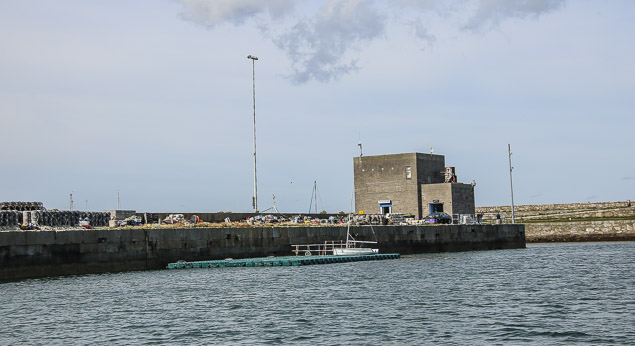 The site identified for the new floating homes in Dun Laoghaire Harbour known locally as the 'ice house' at the Coal Quays Photo: Afloat.ie
The site identified for the new floating homes in Dun Laoghaire Harbour known locally as the 'ice house' at the Coal Quays Photo: Afloat.ie
Floating accomodation is already in use by businesses in the capital, such as at Grand Canal Dock, but this is the first proposal for such a residential development in Ireland.
The Irish Times as more on the story HERE.
Dún Laoghaire Harbour Company Say 'Cruise Berth Facility On Track', An Bord Pleanála Seek Further Information
Dún Laoghaire Harbour Company (DLHC) has issued a statement on its cruise berth facility following yesterday's court case decision in which environmental lobby group Save our Seafront, chaired by local TD Richard Boyd Barret, 'won its legal action against the decision to grant planning permission for the Dún Laoghaire Cruise Terminal'.
The Harbour Company maintain its 'Cruise berth facility is on track' as An Board Pleanála seek further information the state company.
The full ramification of this decision are still being fully analysed but the DLHC statement in full is below:
'Dún Laoghaire Harbour Company (DLHC) has been informed that An Bord Pleanála will not be defending a Judicial Review of the decision of the Bord to grant planning permission to DLHC for the development of a cruise berth facility in the harbour. The Judicial Review had been taken on behalf of Save our Seafront, who had opposed the development. An Bord Pleanála has now determined that certain technical requirements of the Habitats Directive necessitate additional information to be supplied by DLHC. It is recommending that the planning application is sent back to the Bord for this additional information to be assessed. DLHC will co-operate fully with such a request by An Bord Pleanála.
Commenting, DLHC CEO Gerry Dunne pointed out that while the nature of the issues have yet to be outlined in detail they are believed to be “technical and not substantive”. Mr Dunne added that protecting the sensitive environmental and historical significance of the harbour and its environs remain a priority for DLHC.
The proposed 250 metre berth will, it is anticipated, attract c. 50 cruise calls a year (from May to September), an average of 2 a week. The money generated from these visitors will amount to €10m to the local economy annually'.
A statement from Save our Seafront, on yesterday's court case is here.
Is The Future Of Dun Laoghaire Harbour Being Held Hostage?
As Dun Laoghaire residents await An Bord Pleanála's decision on the controversial cruise liner berth proposed for the town's harbour, local banker Paddy Shanahan took a look at the books of the Dun Laoghaire Harbour Company (DLHC) – and finds the whole situation wanting. Harbour CEO Gerry Dunne's response is also posted below.
I am a banker with over 30 years' experience working in New York and London. I have recently returned to Ireland. I am married with two small boys and I run a corporate finance and restructuring practice here in Dublin. I live in Sandycove and am part of Dublin Bay Concern, an organisation comprising many residents of Dun Laoghaire-Rathdown (DLR).
My concern relates to the future status of the Dun Laoghaire Harbour Company (DLHC). I am opposed to the planned super cruise berth terminal for the harbour and to the Masterplan submitted by the DLHC. An Bord Pleanála is currently deliberating on DLHC’s application following a month-long oral hearing.
Meanwhile, the Harbours Bill 2015 was recently introduced into the Oireachtas. This bill will decide the future of DLHC. We are presented with two options, one of which will be decided by Minister for Transport Paschal Donohoe:
a) DLHC becomes a wholly owned subsidiary of the chief executive DLR CoCo.
b) DLHC is dissolved and integrated into DLR CoCo.
On a matter of profound importance to the residents of DLR and to the hundreds of thousands who use the harbour as an amenity every year, there has been little to no communication by the relevant elected representatives back to their constituents on this matter, excepting Richard Boyd Barrett and his party People Before Profit.
Difficult financial situation
On my own volition, I obtained copies of DLHC’s accounts from 2012 to 2014. I have analysed these accounts and found the following:
DLHC’s financial position has been declining in recent years. In 2012 the company’s cash reserves declined by €2.0m and in 2013 by a further €1.3m. The decline in cash was much smaller in 2014 (€37,000) thanks to the receipt of a €406,420 grant, the provenance of which and use for is unidentified in their accounts.
At the end of 2014, DLHC had cash reserves of €3.5m. With no revenue from the Stena HSS in 2015, remaining cash reserves of €3.5m are rapidly dwindling.
DLHC had bank loans of €4.8m at the end of 2014 for which it does not appear to have sufficient cash or the prospect of sufficient cash to repay in future years.
Based on the above facts, it is clear to me that DLHC is in a difficult financial situation and has neither the reserves nor the ability to borrow the funds required to build the proposed cruise berth.
Notwithstanding its precarious financial position and ignoring the implications to the well-being of Dun Laoghaire Harbour, DLHC wishes to roll the dice and stake its future on providing giant cruise berth facilities – this despite the reality of Dublin Port.
Less than 5km from Dun Laoghaire, Dublin Port is a highly profitable world-class shipping port, and it is the preferred cruise ship destination offering quick access to Dublin city centre. It already receives over 80 super-sized cruise ships a year and has recently received planning permission to begin a €200m development which will double its large cruise ship capacity together with a state-of-the-art modern passenger terminal specifically being built for visiting cruise liners.
DLHC proposes a collusive duopoly for the cruise ship business with Dublin Port. Not only is this stupendously naïve, it is also illegal for State-owned bodies to distort the competitive environment, and elegantly demonstrates the flawed business case DLHC proposes – especially in light of the Stena HSS departing for good under DLHC’s watch.
'A likely white elephant'
The Code of Practice for the Governance of State Bodies issued by the Department of Finance in March 1992 and updated October 2001 states that:
“As the ultimate owners of, and investors, in State bodies, citizens and taxpayers have an important and legitimate interest in the achievement of value for money in the State sector. Whether commissioning public services or providing them directly, State bodies have a duty to strive for economy, efficiency, transparency and effectiveness in their expenditure.”
In 2012 and 2013 DLHC received €250,000 and €200,000 in grants from Dun Laoghaire-Rathdown County Council (DLRCoCo) in respect of DLHC’S Large Cruise Liners initiative. The former was for tendering facilities outside the harbour mouth; the latter was toward defraying costs relating to the planning application.
If it transpires that the €400,000 grant unidentified in the accounts for 2014 was from DLRCoCo, then it would appear that nearly €1m of DLR taxpayers' money has been paid over by the council toward the planning costs of building a likely white elephant.
Is it unreasonable to posit a conflict of interest where the executive branch of DLRCoCo making the payments to DLHC houses the same department that approved the planning application currently being decided by An Bord Pleanála? Is this like Hamlet without the prince? Have DLHC fulfilled their obligations under the code regarding transparency and governance? Clearly not. Where is the oversight? There isn’t any.
Allowing true oversight
Addressing the Dáil on the occasion of the Harbours Bill 2015 debate on amendments last Wednesday 2 December, Minister Donohoe specified there is to be an undefined period of due diligence and examination of DLHC prior to its future being decided by himself.
In the interests of democracy let us hope the minister dissolves the DLHC and transfers its unencumbered assets to the local authority, thus allowing true oversight and accountability.
Given the close relationship and history between the non-elected executive branch of DLRCoCo and DLHC, a decision by the minister that makes the DLHC a wholly owned subsidiary of the chief executive will be a step backwards and simply perpetuates the current unsatisfactory status quo.
The future of Dun Laoghaire Harbour should be decided by the elected representatives of DLRCoCo, the harbour’s genuine stakeholders, and its various community groups.
Dun Laoghaire Harbour, dear to the hearts of all residents of DLR, is being held hostage to the ambitions of a dysfunctional organisation that is running out of money and being supported in a clandestine manner against all principles of transparency and governance.
Response from Dun Laoghaire Harbour Company CEO
DLHC has decided that it is not appropriate to make further public comment while An Bord Pleanala is considering our planning application.
Suffice to make the following brief points ;
[a] the European Commission have stated that the grant of €20m towards the Dublin Port development is made on the basis that such support is not given to dedicated infrastructure and facilities for cruise ships. Therefore, Mr Shanahan is fundamentally incorrect in his belief that Dublin Port can provide dedicated cruise infrastructure/facilities
[b] Mr Shanahan might be very interested to know that the four Dun Laoghaire yacht clubs combined make only a very minor financial contribution of c.€70k annually towards the upkeep/maintenance of the infrastructure of the 200 year old man-made harbour. This annual contribution constitutes less than 2% of our annual operating/capital costs.
Gerry Dunne, CEO DLHC
#urbanbeach – Dún Laoghaire Harbour Company hopes to be in a position to open a floating swimming pool and urban beach at the historic East Pier of the Harbour for the 2016 summer season.
Permission was granted in late-2014 by Dún Laoghaire Rathdown County Council, but had been appealed as Afloat.ie reported at the weekend.
The project has been inspired by the popular Badeschiff facility in Berlin, a floating swimming pool on the River Spree. The plan for Dún Laoghaire Harbour includes a floating swimming pool containing heated and treated seawater, utilising a converted river barge which will be located within the Harbour. The facility will include an Urban Beach alongside the floating structure, on Berth 1 adjacent to the East Pier. Changing and toilet facilities, a café, an administration area, and security features are also planned.
The Harbour Company estimates that urban beach has the potential to attract 100,000 visitors per year and to generate over €1 million per annum for the local economy.
Dún Laoghaire Harbour Company hopes to be in a position to open the facility for the summer season in 2016.
According to Tim Ryan, Operation Manager, of DLHC: "Today's go-ahead by An Bord Pleanála is very welcome, and marks a vital step in realising the full potential of the Harbour as a marine, leisure and tourist destination of international calibre."
"The urban beach will be a hugely exciting project for Dun Laoghaire as a while. It is very much in keeping with the Government's National Ports Policy which designated Dún Laoghaire as a harbour focusing on marine leisure, marine tourism, and urban development. Today's decision allows us to follow through on our mandate.
Over the coming months, Dún Laoghaire Harbour Company Harbour is set to welcome a record 100,000 cruise passengers and crew. "Combined with the news of the urban beach, the future for Dun Laoghaire Harbour is really shaping up, as set out in the Company's Masterplan of 2011," added Tim.
Pam Kearney Resigns From Dun Laoghaire Harbour Company Board Over 'Master Plan' Dispute
#DunLaoghaire - Dun Laoghaire Harbour Company director Pam Kearney has resigned over a boardroom dispute over the company's 'master plan', according to yesterday's Sunday Business Post.
The article by Jack Horgan-Jones reports that Kearney tendered her resignation letter last week, citing concerns over "three of the four cornerstone projects" of the plan.
These were named as the diaspora centre (which was scrapped by the Government earlier this year), the cruise liner berth and the 'urban beach' planned for the East Pier.
Kearney's departure comes just weeks after Justin McKenna, Commodore of the Royal St George, also stepped down as a director over his own concerns with the cruise terminal plans.
But harbour company chief executive Gerry Dunne has denied any split in the boardroom, saying it "remains fully behind the implementation of the 2011 master plan".
The Sunday Business Post article also referenced an unpublished engineer's report commissioned by the harbour company that highlighted issues that could cost millions in repairs to the harbour's three main piers.
#dlhc – Royal St. George Yacht Club Commodore Justin McKenna has resigned as a board member of the Dun Laoghaire Harbour Company (DLHC) with immediate effect.
McKenna told members of his decision at a meeting of the country's biggest sailing club last Friday. The meeting was held to discuss controversial DLHC proposals on the new cruise liner berthing arrangements inside the harbour that has drawn the ire of many Dun Laoghaire sailors.
The Minister of Sport appointed McKenna to the Harbour Company Board in March 2014, as Afloat.ie reported at the time.
As the Irish Times reported last Friday there is growing dissatisfaction among 5,000 sailing and boating fans over proposals that, say objectors, will curtail sailing inside the harbour walls.
Royal St. George members have been urged to let their views be known on the 435–metre long quay to be built next to their clubhouse. The club also wants individual sailing classes to make submissions.
It follows an online petition set up by sailors that has attracted 1500 signatures to save 'Dun Laoghaire dinghy sailing'
Friday's meeting was followed by an open session for Royal St. George members. An 'abbreviated version' of the points raised has appeared on club facebook page as follows:
• The councillors should be advised that the city of Venice is considering banning all big cruise liners because they are causing untold damage to the fabric of the city. The income from these liners is valued at 10c per passenger
• Cruise ships are good for Dun Laoghaire, anchored in the bay and we welcome SMALL ships in the harbour.
• Each sailing class should make a submission and encourage submissions
• The economic benefit to Dun Laoghaire is not good from the passenger perspective. There will be initial public interest. However, this will fall off over time as people become bored with them
• The only beneficiaries will be the coach tour operators
• Some basic calculations would indicate that it will take + 100 yrs. to recover the construction cost
• The Dublin Port proposal is in direct competition yet it is only a few miles away.
• The consultation period closes next Monday and it is important that the club advises members to object to the planning board a.s.a.p.
• Dun Laoghaire is the major centre for youth training on the island of Ireland. This proposal will have a detrimental if not fatal effect on this activity
• The scale of the ships is difficult to comprehend and is out of character with a Victorian harbour.
• International Sailing events will not come to Dun Laoghaire. Tourism Ireland will not be happy.
• The Water wag class commenced sailing in the harbour in 1887 and is one of the oldest racing classes in the world.
• Irish Lights have conducted many studies of the harbour bed and a considerable area is covered in granite. Dredging cost numbers will be almost double the cost estimated and Dublin Port will be gaining from the anchoring dues.
DLHC says the plan is to facilitate some of the world's biggest cruise liners berthing inside the harbour. The aim is to regenerate the harbour and town following the loss of the HSS Stena car ferry between Dun Laoghaire and Holyhead in February.
A total of 22 cruise ships are expected to berth this summer, bringing up to 100,000 passengers and crew to the port bringing up to €7m in revenues, 30% of whicdh will be spent locally in Dun Laoghaire, according to DLHC.
A public consultation is underway following DLHC presentations with over 20 separate stakeholders groups.
Observations or comments can be submitted by email to [email protected] or by post to Jean Finnegan, Dun Laoghaire Harbour Company, Harbour Lodge, Crofton Rd, Dun Laoghaire, anytime up to 5pm on Monday, 13th April 2015.
A copy of the DLHC presentation is HERE.
#sdls – A new group, Save Dun Laoghaire Sailing (SDLS), has come forward with radical proposals for a re-configuration of the harbour in order to accommodate the proposed Cruise Liner Berth in the harbour, (plans of which were revealed on Afloat.ie last Thursday), while at the same time maintaining the town's pre-eminent role as Ireland's greatest sailing centre.
A spokesperson for SDLS said that the new group's proposals were still only at a very preliminary stage, but the extremely short time lapse permitted for objections or modifications to the Harbour Company's plan has meant that they have had to act in great haste.
However, the spokesperson asserted that the harbour's thousands of recreational sailors are so concerned at some elements of the new plan - such as the rumoured intention to forbid boats manoeuvring under sail only, let alone racing, within the harbour – that they have had no trouble in recruiting supporters, and an ad hoc inaugural meeting in recent days instructed an acting committee to proceed as rapidly as possible.
The underlying thinking behind SDLS's proposals is that the areas of activity for the different interests within the harbour should be clearly delineated. "Good fences make good neighbours" is the group's core philosophy, and with this in mind they have proposed two new in-harbour breakwaters in order that the large area in the centre of the harbour, which is intended for use by the new cruise liner berthing facilities, will be walled off from other areas of the port.
This will be done by a new in-harbour breakwater from St Michael's Pier to the outer end of the present East Pier, and another small in-harbour breakwater closing off the present outer entrance to the marina.
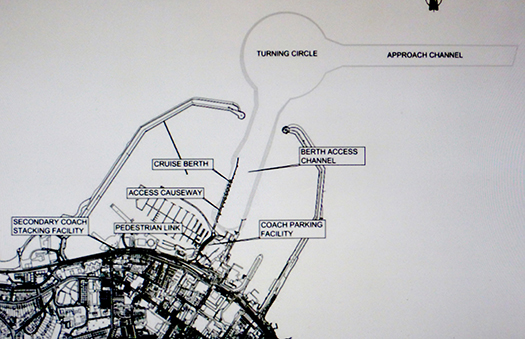
Dun Laoghaire Harbour with the Harbour Company's proposed Cruise Liner Berth occupying most of the space between St Michael's Pier and the harbour entrance
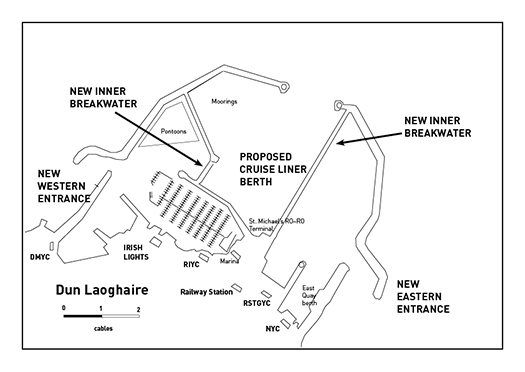
Radical proposals from SDLS (Save Dun Laoghaire Sailing) include new Eastern and Western entrances to the harbour, and two new in-harbour breakwaters which will clearly separate the cruise liner areas from the recreational sailing and boating areas. In effect, three new harbours will be created.
In order to make this feasible, the group has come up with the visionary concept of giving Dun Laoghaire Harbour two additional entrances. The new entrance to the east would be created by making a gap in the existing East Pier, and would inevitably be expensive, as this is exposed to onshore winds, and thus would require a very substantial sheltering breakwater. However, it would still be as cost-effective as possible, as this new Eastern Entrance would not need to be nearly as wide as the current main entrance, as that was created in order to be negotiated by the cumbersome sailing ships of the early 19th Century.
When Afloat.ie pointed out to the spokesperson (who wishes to remain anonymous for the time being) that a gap in the East Pier would result in the ending of the time-honoured tradition of South Dubliners walking the length of the pier on a Sunday, the response was that the demographic is such that an increasing number of South Dubliners are so aged as to be no longer capable of walking the entire length of the East Pier, and thus they would welcome the shorter walk to the lighthouse which will be provided by the new inner breakwater direct from St Michael's Pier.
A further question about the need for manoeuvring space for the cruise liners between their proposed berth and the East Pier elicited the reply that the Harbour Company have already made it clear that they will have to dredge a ten metre channel from the present main entrance to the new berth to serve the deeper drafted liners. Therefore the building of a new pier along the eastern edge of this dredged channel will not impinge on the cruise liners' area of access, and will moreover restrain small craft which might be sailing or racing in the eastern harbour from straying into the liner area.
SDLS is particularly enthused about the possibilities offered by he new western entrance. "For far too long, the West Pier has been more like the Wild West Pier than part of a civilised harbour," we were told. Now, with the new entrance, it will be brought centre stage, and those dinghy sailors from the RIYC, the DMYC, the INSS and the Coal Harbour who were formerly reluctant to venture into the open waters of Dublin Bay will find they have easy access to the relatively sheltered Bay waters between the West Pier and Seapoint.
SDLS conclude their initial policy document by pointing out that their plan would in effect provide the benefit of having three harbours where at present only one exists. And for further diversity, they suggest that the central commercial area for the cruise liners could possibly, in time, also accommodate some working fishing boats, as the colourful activity of hardy fisherfolk is much appreciated by cruise liner passengers
As to the fact that the creation of two new entrances means in effect that there will now be two completely separate leisure harbours on the south side of Dublin Bay with their entrances one and a half miles apart, SDLS argues that this is one of the most attractive features of their plan.
"Sailing enthusiasts from places blessed with natural advantages and numerous little ports of call, such as Cork Harbour, are always bemoaning the fact that when you sail out of Dun Laoghaire, there is nowhere convenient to go to within easy reach. But thanks to our plan, we can now envisage that a boat which has to go to sea via the new West Entrance could go out for a nice sail in Dublin Bay, and then go visiting in the eastern part of the harbour through the new Eastern Entrance, and vice versa.
Having considered these attractive options, we don't see the proposed new cruise liner berth as a problem. On the contrary, we see it as an opportunity to make Dun Laoghaire a much more interesting place to sail from".
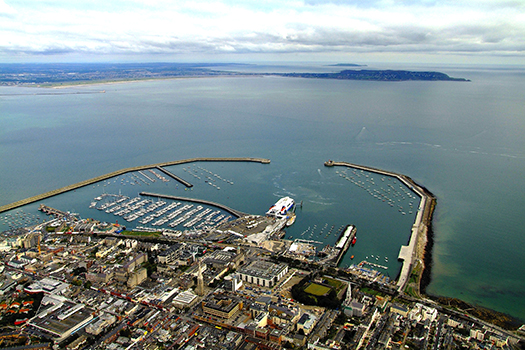
Dun Laoghaire harbour largely as it is today, although the presence of the HSS ferry in port is now history and the contentious new library has been inserted in the tree-surrounded green space at right foreground. Photo courtesy ICC.
Editor's Note: Normally our April 1st special would be pulled at noon. But as virtually all plans for a totally artificial harbour at Dun Laoghaire, ever since the first ones more than two hundred years ago, have been initially treated as an April Fool joke, we think we'll let this one run. And further comments are welcome, for underlying the tomfoolery, a very serious situation is developing for the harbour's future.
